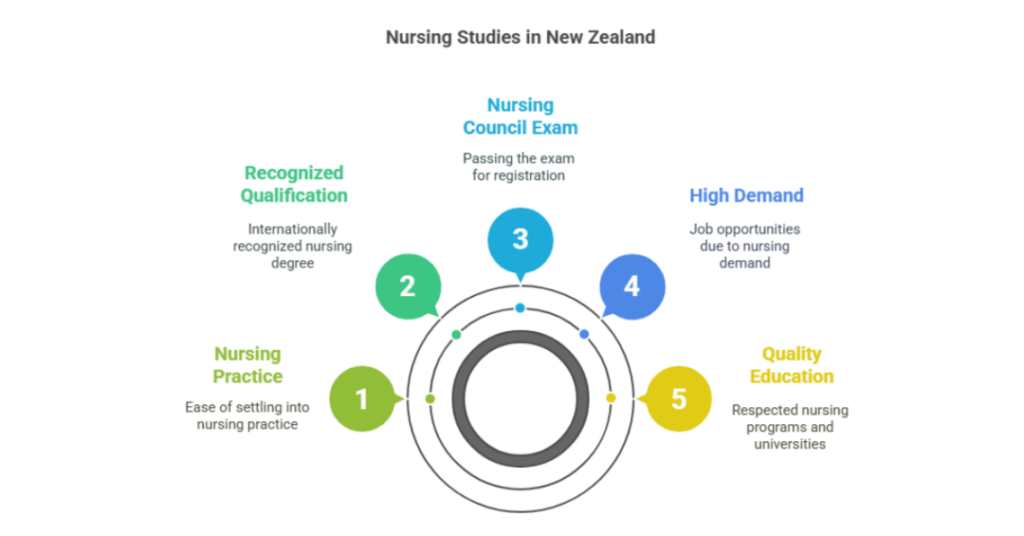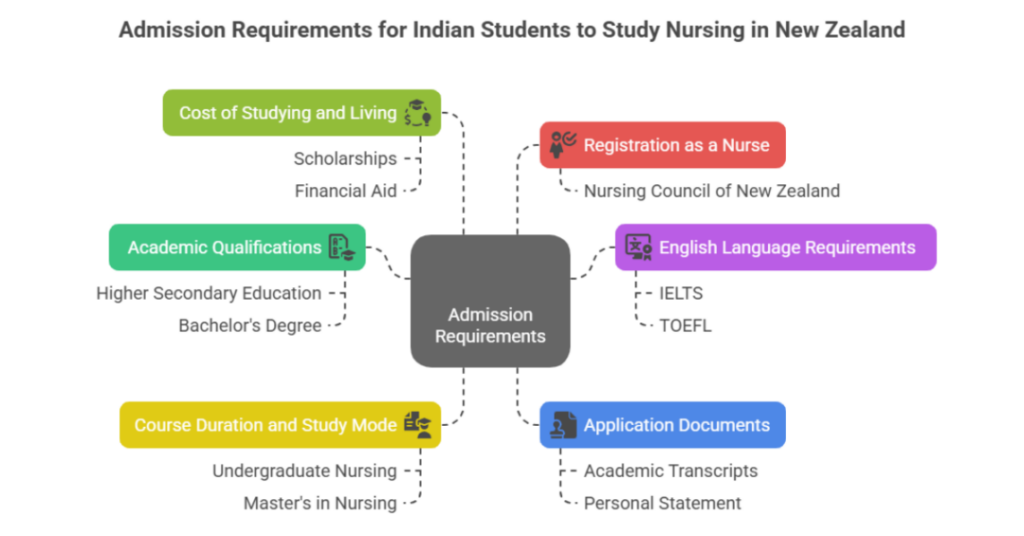24 May 2025
6 minutes read
Requirements to Study Nursing in New Zealand for Indian Students

Key Takeaways
- Requirements to study nursing in New Zealand include meeting academic, English language, and financial criteria for admission to top universities.
- Nursing programs from bachelor’s to master’s degrees prepare students for careers in a high-demand nursing sector.
- Careful planning of tuition, living expenses, visa, and licensing with expert help like Ambitio boosts your chances of success.
Did you know that nursing is one of the fastest growing professions in New Zealand? Indian students seeking to study nursing in New Zealand find it challenging due to the tough admission criteria, high tuition fees and living costs – all of which can be overwhelming.
Successfully navigating nursing programs, such as bachelor of nursing degrees to master’s in nursing and English language requirements is quite a hurdle to cross. Knowing what requirements an Indian student needs to study nursing in New Zealand better equips you on your pathway to become a registered nurse and practice nursing successfully.
Why Choose New Zealand for Nursing Studies?
New Zealand presents international students with quality universities and nursing colleges providing nursing courses for undergraduate and master’s degrees. Indian international students seeking to acquire their nursing qualifications in New Zealand benefit from respected nursing programs, lower entry requirements, and support from scholarships for International students.

As the demand for nursing in NZ remains high, students will complete their nursing degree, sit the Nursing Council of New Zealand exam to register as Nurse Practitioners, receive a recognised New Zealand qualification, and be offered opportunities to settle into their nursing practice with ease.
10 Top Universities for Studying a Nursing Degree in New Zealand
New Zealand is renowned for its high-quality education and welcoming environment for international students. Those who want to study nursing in New Zealand can choose from top universities and nursing colleges offering professional degrees, including bachelor of nursing programmes and master’s degrees in nursing.
Indian students must understand the requirements to study nursing in New Zealand, including course details, eligibility fees, and admission criteria to complete their nursing degree and register as a nurse.
| University Name | Average Tuition Fees (NZD) | Average Salary (NZD/year) | Exams Required |
|---|---|---|---|
| University of Auckland | 35,000 | 70,000 | IELTS/TOEFL, NCEA |
| University of Otago | 32,000 | 68,000 | IELTS/TOEFL |
| Massey University | 30,000 | 65,000 | IELTS/TOEFL |
| Victoria University of Wellington | 31,000 | 67,000 | IELTS/TOEFL |
| Auckland University of Technology | 28,000 | 64,000 | IELTS/TOEFL |
| University of Canterbury | 29,000 | 66,000 | IELTS/TOEFL |
| Eastern Institute of Technology | 25,000 | 60,000 | IELTS/TOEFL |
| Manukau Institute of Technology | 24,000 | 62,000 | IELTS/TOEFL |
| Whitireia New Zealand | 23,000 | 60,000 | IELTS/TOEFL |
| Southern Institute of Technology | 22,000 | 58,000 | IELTS/TOEFL |
Admission Requirements for Indian Students to Study Nursing in New Zealand
Indian students who want to study nursing in New Zealand must meet specific admission requirements to enroll in top universities and nursing colleges. Whether aiming for a bachelor’s degree or a master of nursing, students need to understand the eligibility criteria for nursing courses in New Zealand.

Completing a nursing program in New Zealand not only leads to a professional degree in nursing but also opens doors to registration as a nurse and a promising career in nursing practice.
- Academic Qualifications: Students at the undergraduate level must have completed their higher secondary education with science subjects to gain admission to the bachelor of nursing programme at top New Zealand universities and colleges. International graduate students interested in a master’s degree in nursing must hold a relevant bachelor’s degree.
- English Language Requirements: International students need to fulfil English proficiency tests such as IELTS or TOEFL to meet universities’ minimal entry requirements, including the University of Auckland international student criteria.
- Course Duration and Study Mode: Nursing programs in New Zealand typically require full-time study over three years for undergraduate nursing, with some masters in nursing in New Zealand requiring 1–2 years.
- Application Documents: Students may be required to submit academic transcripts, proof of English proficiency, a personal statement, and references when applying to nursing universities and nursing colleges in New Zealand.
- Registration as a Nurse: After completing a degree in nursing or a professional nursing programme, nursing graduates must sit the Nursing Council of New Zealand registration to become a registered nurse in New Zealand.
- Cost of Studying and Living: Indian students should consider the cost of studying and living in New Zealand, which varies by university and city. Scholarships and financial aid are available at some colleges in New Zealand.
Meeting these requirements to study nursing in New Zealand for Indian students is crucial to complete your nursing degree successfully and thrive in nursing practice in NZ’s high-demand healthcare sector.
Types of Nursing Programs Available in New Zealand
Indian students exploring the requirements to study nursing in New Zealand have access to a variety of nursing programs offered by top universities in New Zealand.
These programs are designed to prepare students for a career in a country where there is a high demand for nurses, with courses available at different levels to suit diverse educational backgrounds.
- Bachelor of Nursing: An undergraduate degree offered by many universities where the course combines theory and practical training to prepare students for registration as a nurse.
- Master of Nursing: A postgraduate program for nursing graduates or professionals seeking advanced knowledge and specialization.
- Diploma in Enrolled Nursing: A shorter program focusing on practical skills for those interested in becoming enrolled nurses.
- Nursing Bridging Programs: Designed for internationally qualified nurses to meet New Zealand’s registration requirements.
- Postgraduate Diplomas and Certificates: Specialized courses in areas such as nurse practitioner training, mental health, and aged care nursing.
These diverse programs ensure Indian students can find the right fit to complete their nursing education in New Zealand, meeting both academic and professional requirements.
Financial Requirements and Scholarships for Indian Nursing Students
Indian students who want to study nursing in New Zealand must carefully plan for the financial requirements, including tuition fees and living costs.
While New Zealand offers top universities to study nursing, understanding the cost of studying and available scholarships like the Auckland International Student Excellence Scholarship can ease the financial burden and support your study abroad journey.
| University Name | Average Tuition Fees (NZD) | Cost of Living (NZD/year) | Scholarships Available |
|---|---|---|---|
| University of Auckland | 35,000 | 15,000 | Auckland International Student Excellence Scholarship |
| University of Otago | 32,000 | 14,500 | New Zealand Excellence Awards |
| Massey University | 30,000 | 14,000 | Various merit-based scholarships |
| Victoria University of Wellington | 31,000 | 15,000 | Scholarships for international undergraduate students |
| Auckland University of Technology | 28,000 | 13,500 | Scholarships and bursaries |
| University of Canterbury | 29,000 | 14,000 | International student scholarships |
Indian students must fulfil the requirements to study nursing in New Zealand, including financial planning for the three-year nursing program. Nursing can be a great career path as nurses are in demand across different areas of nursing in New Zealand, making this investment worthwhile for international students seeking professional nursing qualifications.
New Zealand Student Visa Requirements and Procedures for Indian Nursing Students
Indian students who want to study nursing in New Zealand must understand the student visa requirements and procedures to ensure a smooth transition.
New Zealand offers top universities and nursing colleges with courses in nursing designed for international students, but visa approval depends on meeting specific criteria related to the course, cost of living, and academic qualifications.
- Acceptance from a University in New Zealand: Students must have an offer letter from a recognized nursing university or college where the course is approved.
- Proof of Funds: Indian students need to show evidence of sufficient funds to cover tuition fees, cost of living in New Zealand, and return travel.
- Health and Character Checks: Students may require medical examinations and police clearance certificates as part of the visa application.
- English Language Proficiency: Meeting the English language requirements is mandatory as universities require minimal entry requirements to ensure students can cope with academic demands.
- Visa Application: The visa application must be submitted online with all supporting documents, including acceptance letters, financial proof, and identification.
- Duration and Work Rights: The student visa duration aligns with the nursing course length; students may be allowed part-time work during study and full-time work during breaks.
Meeting the requirements to study nursing in New Zealand for Indian students includes understanding and completing the student visa process to study abroad successfully at top nursing universities in New Zealand.
Registration and Licensing to Practice Nursing in New Zealand After Graduation
After graduation, Indian students who study in New Zealand must complete registration and licensing to practice nursing professionally.
New Zealand’s top universities provide nursing programs aligned with the Nursing Council’s standards, ensuring graduates meet the requirements to practice safely in a country where nurses are in high demand.
Nursing also requires passing the Nursing Council of New Zealand’s competency assessment. Different universities and colleges ensure students receive comprehensive training, following a large-scale review of courses to maintain quality.
New Zealand may offer pathways for internationally qualified nurses to gain registration and begin their nursing careers successfully. Meeting these requirements to study nursing in New Zealand is essential for Indian students aiming for professional nursing practice.
Conclusion
Meeting the requirements to study nursing in New Zealand can feel overwhelming for Indian students, but with the right guidance, your dream of becoming a registered nurse in New Zealand is within reach.
From academic eligibility to visa procedures and registration, every step demands careful planning. That’s where Ambitio comes in — as a dedicated study abroad consultancy specializing in profile building, we simplify the process, tailor your application, and boost your chances of success.
Ready to take the next step? Connect with Ambitio Elite today and turn your nursing aspirations into reality with expert support every step of the way!
FAQs
Why is New Zealand a preferred destination for nursing studies?
New Zealand offers top-tier universities, high-quality education, and a great lifestyle, making it a sought-after destination.
How long is the bachelor of nursing programme in New Zealand?
It is typically a three-year full-time study program.
Are scholarships available for international students?
Yes, scholarships like the Auckland International Student Excellence Scholarship are available for deserving candidates.
Is IELTS mandatory for nursing in NZ?
English language proficiency is crucial. IELTS is one of the accepted tests, but specific requirements vary by university.
What are the career prospects after completing a nursing degree in New Zealand?
Graduates can work as registered nurses in hospitals, clinics, and other healthcare settings. With experience, they can also take on specialized roles or administrative positions.

You can study at top universities worldwide!
Get expert tips and tricks to get into top universities with a free expert session.
Book Your Free 30-Minute Session Now! Book a call now




























